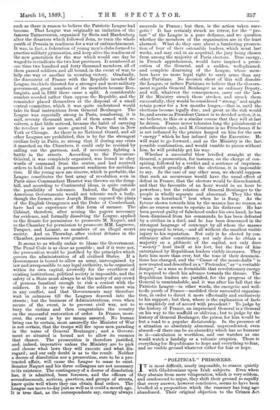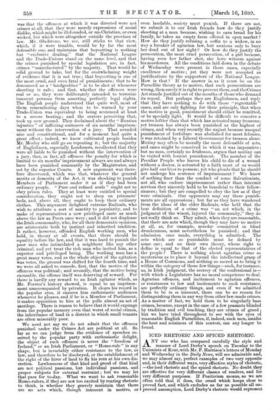" POLITICAL " PRISONERS.
IT is most difficult, nearly impossible, to reason quietly with Gladstonians upon Irish subjects. Even when they abstain from mere vituperation, which is very seldom, and condescend to argue, they shift their ground so rapidly that every answer, however conclusive, seems to have been levelled at a proposition which the reasoner has long ago. abandoned. Their original objection to the Crimes Act was that the offences at which it was directed were not crimes at all, that they were merely expressions of social dislike, which might be ill-founded, or un-Christian, or even wicked, but which were altogether outside the province of law. Mr. Gladstone, we see, still sticks to that view, which, if it were tenable, would be by far the most defensible one, and maintains that boycotting is nothing but "exclusive dealing," that the National League and the Trade-Unions stand on the same level, and that the crimes punished by special legislation are, in fact, crimes " manufactured " by the majority. That would be solid ground to take, but for the overwhelming weight of evidence that it is not true ; that boycotting is one of the most cruel, and even fatal of punishments ; that to be denounced as a " landgra.bber " is to be shot at whenever shooting is safe ; and that, whether the offences were real or no, they were deliberately intended to terrorise innocent persons from asserting perfectly legal rights. The English people understood that quite well, most of them remembering days when to be warned by your Trade-Union was equivalent to being sentenced at least to a severe beating ; and the orators perceiving that, took up new ground. They declaimed about the "Russian injustice" of inflicting sentences of six months' imprison- ment without the intervention of a jury. That sounded nice and constitutional, and for a moment had quite a great effect; indeed, we know cultivated people besides Mr. Morley who still go on repeating it ; but the majority of Englishmen, especially Londoners, recollected that they were all liable to be punished without the intervention of a jury, that, in fact, all offences the penalty for which is limited to six months' imprisonment always are and always have been punished summarily by the Magistrates, and not by the superior Courts. A new argument was there- fore discovered, which was that, whatever the general merits or demerits of the Act, it was shocking to punish Members of Parliament under it as if they had been ordinary people. "Pure and refined souls" ought not to obey prison rules. They at least were entitled to special consideration, they ought not to sleep on prisoners' beds, and, above all, they ought to keep their ordinary clothes. This argument delighted extreme Radicals, who wish to attribute a sort of sanctity to popularity, and to make of representatives a new privileged caste as much above the law as Peers once were ; and it did not displease the-Irish commonalty, who, for all their democratic opinions, are aristocratic both by instinct and inherited tradition. It rather, however, offended English working men, who hold, in theory at all events, that there should be equality before the law, and that it was hard to punish the poor man who intimidated a neighbour like any other criminal, and yet treat the rich man who incited him, as a superior and privileged being. The working man has a great many votes, and as the whole object of the agitation was votes, the ground was shifted for the fourth time, and we were all asked to concede, first, that the motive of the offences was political ; and secondly, that the motive being excusable, the offence itself was deserving of reward. For there is hardly any reward to an Irish agitator which, as Mr. Forster's history showed, is equal to an imprison- ment unaccompanied by privation. It clears his record in the popular eyes, it ensures him enthusiastic audiences whenever he pleases, and if he is a Member of Parliament, it makes opposition to him at the polls almost an act of Sacrilege. There is reason to believe that it would expunge from the popular memory even that worst of social crimes, the inheritance of land, in a district in which small tenants are often miserably poor.
We need not say we do not admit that the offences punished under the Crimes Act are political at all. So far as we can judge from the evidence of speeches re- ceived by the popular party with enthusiastic delight, the object of such offences is never the "freedom of Ireland," or an Irish Parliament, or " Home-rule " in any shape, but is invariably either resistance to the law, as Jaw, and therefore to be disobeyed, or the establishment of the right of the hirer of land to fix his rent at his own dis- cretion. Lawlessness of that kind and greed of that kind are not political passions, but individual passions, and proper subjects for external restraint ; but we may let that pass for to-day. What we want to ask reasonable Home-rulers, if they are not too excited by roaring rhetoric to think, is whether they gravely maintain that there are no acts which, though innocent in motive, or even laudable, society must punish. If there are not, we submit it to our Irish Mends how do they justify shooting at a man because, wishing to earn bread for his family, he takes an empty farm offered in open market ? How do they justify refusing a coffin to a widow, in no way a breaker of agrarian law, but anxious only to bury her dead out of her sight ? Or how do they justify the persecution, the most cruel persecution, of a girl because, having seen her father shot, she bore witness against his murderers. All the conditions laid down in the debate of Wednesday were present in those cases, especially excellence of motive ; yet they were not accepted as justifications by the supporters of the National League. How is that ? If the answer is, as it must be on the Parnellite theory as to motive, that such persecutions are wrong, then surely it is right to prevent them, and the Crimes Act stands justified out of the mouths of those who demand. its repeal. But perhaps they are Englishmen, and reply that they have nothing to do with those " regrettable " cases, and are only fighting for their principle, that when the motive is good, punishment should either be remitted, or be specially light. It would be difficult to conceive a motive loftier than that which has actuated many treasons; yet treason has always been punished as the highest of crimes, and when very recently the unjust because unequal punishment of forfeiture was abolished for most felonies, it was retained by a Liberal Government for treason alone. Mutiny may often be morally the most defensible of acts, and cases might be conceived in which it was imperative; but no man, certainly no Irishman, argues that mutiny can be visited with lenient punishment. The member of the Peculiar People who leaves his child to die of a wound without a doctor, is actuated by a faith most of us would give half our lives to possess; yet who pleads that he should not undergo his sentence of imprisonment ? We know of nothing finer than the conduct of some Salvationists, not all, who endure imprisonment rather than intermit services they sincerely hold to be beneficial to their fellow- sinners ; but they are compelled to obey the law as if they were criminals. Our opponents may say these punish- ments are all oppressions ; but far as they have wandered from the ideas of the older Radicals, who held that the best definition of a crime was "an act which, in the judgment of the wisest, injured the community," they do not really think so. They admit, when they are reasonable, that there are acts which, though they may have no motive at all, as, for example, murder committed in blind drunkenness, must nevertheless be punished ; and that admission once made, everything is admitted. The acts which are so punishable must be -defined by some one ; and on their own theory, whose right to define is equal to that of the elected representatives of the people ? There is nothing about agrarian crime so mysterious as to place it beyond the intellectual grasp of a House of Commons, and nothing so sacred as to bring it within the category of those few things—such, for instance, as, in Irish judgment, the secrecy of the confessional is— with which a Legislature has no moral competence to deal. Agrarian offences, and incitement to agrarian offences, or resistances to law and incitemehts to such resistance, are perfectly ordinary things, and even if we admitted them to be in se innocent, there can be no reason for distinguishing them in any way from other law-made crimes. As a matter of fact, we hold them to be singularly base crimes, because, except in the case of a few peasants blinded by tradition and evil teaching, they are crimes of greed ; but we have tried throughout to see with the eyes of reasonable English Pamellites, if, indeed, such men, amidst the heat and noisiness of this contest, can any longer be found.



































 Previous page
Previous page